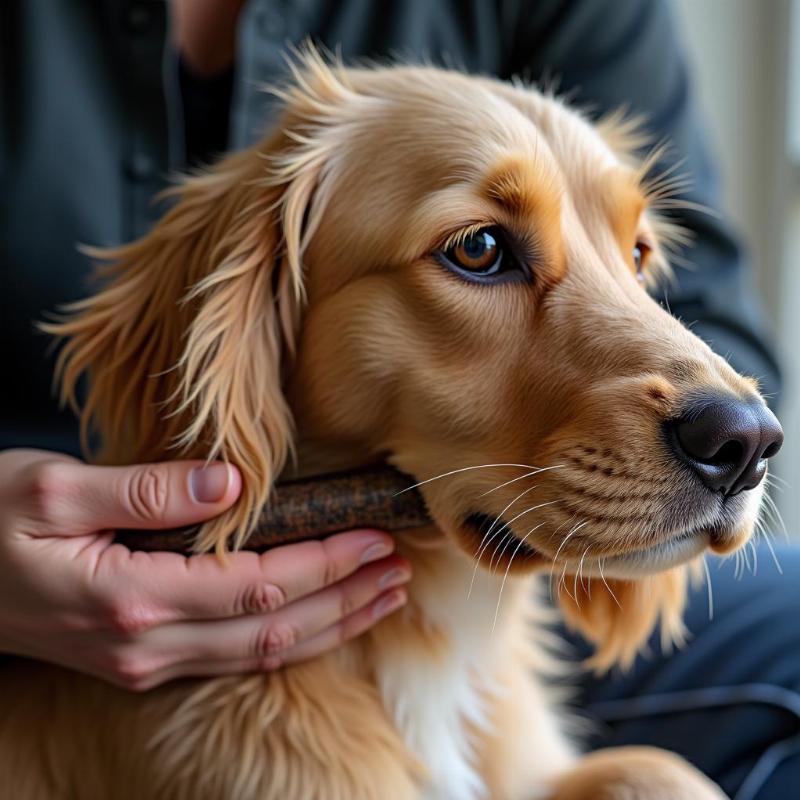Are you captivated by the charming Basset Fauve de Bretagne and eager to welcome one into your life? Finding the right breeder and ensuring a healthy, happy pup requires careful research and preparation. This comprehensive guide will equip you with everything you need to know about locating a Basset Fauve de Bretagne near you, from understanding the breed’s unique characteristics to navigating the adoption process.
Understanding the Basset Fauve de Bretagne
Basset Fauve de Bretagnes are spirited, affectionate, and intelligent hounds originally bred for hunting small game. Their rough, golden coat, expressive eyes, and playful nature make them irresistible companions. Before searching for a “Basset Fauve De Bretagne Near Me,” it’s crucial to understand if this breed is the right fit for your lifestyle. They thrive on activity and require regular exercise, mental stimulation, and consistent training. Their strong hunting instincts mean they can be prone to chasing small animals, so a securely fenced yard is essential.
Temperament and Trainability
These dogs are known for their cheerful disposition and love for their families. They are generally good with children and other dogs, but early socialization is key to ensuring they develop into well-adjusted adults. While intelligent, their independent nature can sometimes make training a bit challenging. Positive reinforcement methods, patience, and consistency are vital for successful training.
Exercise and Health Considerations
Basset Fauve de Bretagnes have moderate exercise needs and enjoy activities like hiking, running, and playing fetch. Regular exercise is crucial not only for their physical health but also for preventing boredom and destructive behaviors. Potential health concerns include back problems, ear infections, and hip dysplasia. Choosing a reputable breeder who screens their dogs for these issues can significantly reduce the risk.
Locating a Reputable Breeder
Finding a “Basset Fauve de Bretagne near me” starts with thorough research. A responsible breeder prioritizes the health and well-being of their dogs. They will be knowledgeable about the breed, screen their breeding dogs for health issues, and provide a clean, nurturing environment for their puppies.
Utilizing Online Resources
The internet offers several resources for finding breeders. Breed-specific rescue organizations, online directories, and social media groups can be valuable tools. However, it’s important to approach online information with caution and verify the credibility of any breeder you find.
Attending Dog Shows and Events
Attending dog shows and breed-specific events can be a great way to connect with reputable breeders and learn more about the Basset Fauve de Bretagne. These events provide an opportunity to meet breeders in person, observe their dogs, and ask questions about their breeding practices.
Questions to Ask a Potential Breeder
Once you’ve identified a potential breeder, it’s crucial to ask the right questions. This will help you assess their breeding practices and ensure they are a good fit for you and your future furry friend.
- Can I meet the parents of the puppies?
- What health screenings have been performed on the breeding dogs?
- What is the socialization and early development program for the puppies?
- What is your return policy if the puppy develops health issues or doesn’t fit in with my family?
- Can you provide references from previous puppy buyers?
Preparing for Your New Puppy
Bringing a new puppy home is an exciting time, but it’s important to be prepared. Ensure you have all the necessary supplies, including food, bowls, a crate, toys, and grooming tools. Puppy-proof your home to prevent accidents and create a safe, comfortable space for your new companion.
The Adoption Process
The adoption process typically involves an application, interview, and home visit. Be prepared to discuss your lifestyle, experience with dogs, and plans for providing a loving and stimulating environment for your new Basset Fauve de Bretagne. A responsible breeder will want to ensure their puppies are going to good homes.
Welcoming Your Basset Fauve de Bretagne Home
Bringing your new puppy home is a joyous occasion. Be patient as they adjust to their new surroundings and establish a routine. Early socialization, consistent training, and plenty of love and attention will help your Basset Fauve de Bretagne thrive.
 Adult Basset Fauve de Bretagne Running in a Field
Adult Basset Fauve de Bretagne Running in a Field
Ongoing Care and Training
Consistent training and socialization are essential for raising a well-behaved and happy Basset Fauve de Bretagne. Enroll in puppy classes and continue training throughout their life to reinforce good behavior and address any challenges that may arise.
Nutrition and Grooming
Providing a high-quality diet formulated for active breeds is crucial for maintaining your dog’s health and energy levels. Regular grooming, including brushing their coat and cleaning their ears, is also important for preventing health issues.
 Grooming a Basset Fauve de Bretagne
Grooming a Basset Fauve de Bretagne
Conclusion
Finding a “Basset Fauve de Bretagne near me” involves careful research and preparation. By understanding the breed’s characteristics, locating a reputable breeder, and committing to ongoing care and training, you can welcome a loving and loyal companion into your life. Remember, choosing a Basset Fauve de Bretagne is a significant decision that requires commitment and dedication. With the right approach, you can enjoy the many rewards of sharing your life with this charming and spirited breed.
FAQ
-
Are Basset Fauve de Bretagnes good with children?
Generally, yes, but early socialization is key. -
How much exercise does a Basset Fauve de Bretagne need?
They need moderate exercise, including daily walks and playtime. -
Are Basset Fauve de Bretagnes easy to train?
They are intelligent but can be independent, requiring patience and positive reinforcement. -
What are the common health concerns of Basset Fauve de Bretagnes?
Back problems, ear infections, and hip dysplasia are potential concerns. -
Where can I find a reputable Basset Fauve de Bretagne breeder?
Breed-specific rescue organizations, online directories, and dog shows are good starting points. -
What should I ask a potential breeder?
Inquire about health screenings, socialization practices, and their return policy. -
What do I need to prepare for a new puppy?
Food, bowls, a crate, toys, grooming tools, and a puppy-proofed home are essential.
